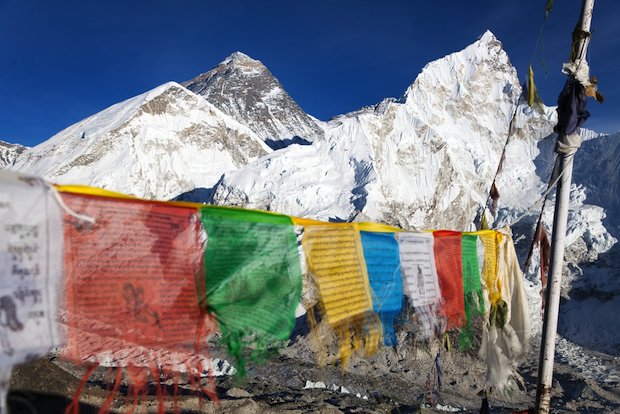In the aftermath of this weekend’s epic earthquakes in Nepal, the victims and survivors are on my mind. I find myself thinking of Mount Everest and the people killed there. To be sure, with 19 dead and as many as 200 climbers stranded, the recent death and devastation at Mount Everest are comparatively minor when you understand that across Nepal, there may be as many as 10,000 dead, 100,000 injured and a million people in need of water and safe shelter.
Of course, human tragedy is not zero-sum. And when it comes to pain, there’s no such thing as “comparatively speaking.” A loss of one equals an entire lost world, for those who have lost someone they love – a valuable thing to bear in mind as we become increasingly upset with the rising death toll in Nepal. But that’s not the reason I’m thinking about Everest.
Last year, 16 Nepalese sherpas died leading trips for tourist climbers… Is it time to reevaluate some things here?
In thinking about Mount Everest, there’s a lesson for all of us in the events there. And while it’s not meant to detract from the mourning process, it demands attention whether we are adventure-seekers or not. It’s about seriously integrating this wisdom teaching: Just because we can do something doesn’t mean we should do it.
Until 20 years ago, climbing Everest was a feat attempted by no more than a few people a year. It was limited to accomplished climbers who spent lifetimes preparing for the culmination of their life’s passion. And then it became a business. You may recall that writer Jon Krakauer (Into Thin Air), who survived a blizzard that killed eight fellow climbers in 1996, has been famously critical of the commercialization of Everest tourism. For more reasons that can be listed here, scaling the highest mountain on Earth became a purchasable commodity for some, a notch in the belt which could be had for a few hundred thousand dollars – a modest amount for the ?ber-wealthy.
Don’t get me wrong, I’m all for people using their money as they choose, not as others choose for them. But all principles have limits. And it may be that we’ve reached the limits of that principle, as this is the second mass tragedy on Everest in 13 months. Last year, 16 Nepalese sherpas died leading trips like the ones described above. (Jamling Tenzing Norgay, son of the first sherpa to summit Everest in 1953, has written eloquently about the dynamic between wealthy climbers and the local sherpas whose livelihoods depend on helping them.) People asked then, and I am asking now: Is it time to reevaluate some things here? Just because some consumers can pay for something, is it really appropriate to offer it in the market?
Of course, there’s no easy, singular answer to that question – and it’s a question certainly not limited to the ethics of Everest. This most recent tragedy simply reminds us, painfully, that we often confuse our ability to do something with the wisdom of doing it. We confuse, I think, the wisdom found in maximizing the personal freedom to make choices with the wisdom necessary to say no. We forget that just because we can, doesn’t necessarily mean we should.

Listed for many years in Newsweek as one of America’s “50 Most Influential Rabbis” and recognized as one of our nation’s leading “Preachers and Teachers,” by Beliefnet.com, Rabbi Brad Hirschfield serves as the President of Clal–The National Jewish Center for Learning and Leadership, a training institute, think tank, and resource center nurturing religious and intellectual pluralism within the Jewish community, and the wider world, preparing people to meet the biggest challenges we face in our increasingly polarized world.
An ordained Orthodox rabbi who studied for his PhD and taught at The Jewish Theological Seminary, he has also taught the University of Pennsylvania, where he directs an ongoing seminar, and American Jewish University. Rabbi Brad regularly teaches and consults for the US Army and United States Department of Defense, religious organizations — Jewish and Christian — including United Seminary (Methodist), Yeshivat Chovevei Torah (Modern Orthodox) Luther Seminary (Lutheran), and The Jewish Theological Seminary (Conservative) — civic organizations including No Labels, Odyssey Impact, and The Aspen Institute, numerous Jewish Federations, and a variety of communal and family foundations.
Hirschfield is the author and editor of numerous books, including You Don’t Have To Be Wrong For Me To Be Right: Finding Faith Without Fanaticism, writes a column for Religion News Service, and appears regularly on TV and radio in outlets ranging from The Washington Post to Fox News Channel. He is also the founder of the Stand and See Fellowship, which brings hundreds of Christian religious leaders to Israel, preparing them to address the increasing polarization around Middle East issues — and really all currently polarizing issues at home and abroad — with six words, “It’s more complicated than we know.”

